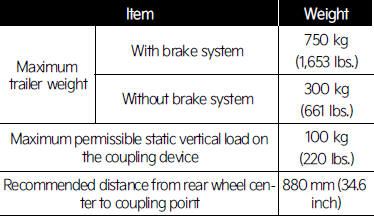KIA Niro: If you do decide to tow a trailer
Here are some important points if you decide to tow a trailer:
- Consider using a sway control. You can ask a hitch dealer about sway control.
- Do not do any towing with your vehicle during its first 2,000 km (1,200 miles) in order to allow the motor to properly break in. Failure to heed this caution may result in serious motor damage.
- When towing a trailer, Kia recommends that you consult an authorized Kia dealer/service partner on additional requirements such as a towing kit, etc.
- Always drive your vehicle at moderate speed of less than 100 km/h (60 mph).
- The driving range of Electric Vehicle could be affected by the shape and weight of the trailer. Depending on the trailer, the driving range could decrease by 50%.
- On a long uphill grade, do not exceed 70 km/h (45 mph) or the posted towing speed limit, whichever is lower.
- The chart contains important considerations that have to do with weight:
Reference weight and distance when towing a trailer

Weight of the trailer
What is the maximum safe weight of a trailer? It should never weigh more than the maximum trailer weight with trailer brakes. But even that can be too heavy.
It depends on how you plan to use your trailer. For example, speed, altitude, road grades, and outside temperature as well as how often your vehicle is used to tow a trailer are all important. The ideal trailer weight can also depend on any special equipment that you have on your vehicle.
Weight of the trailer tongue
The tongue load of any trailer is an important weight to measure because it affects the total gross vehicle weight (GVW) of your vehicle. This weight includes the curb weight of the vehicle, any cargo you may carry in it, and the people who will be riding in the vehicle.
And if you tow a trailer, you must add the tongue load to the GVW because your vehicle will also be carrying that weight.
The trailer tongue should weigh a maximum of 10% of the total loaded trailer weight, within the limits of the maximum trailer tongue load permissible.
After you have loaded your trailer, weigh the trailer and then the tongue separately to see if the weights are acceptable.
If they are not, you may be able to correct them simply by moving some items around in the trailer.
WARNING
- Never load a trailer with more weight in the rear than in the front. The front should be loaded with approximately 60% of the total trailer load; the rear should be loaded with approximately 40% of the total trailer load.
- Never exceed the maximum weight limits of the trailer or trailer towing equipment. Improper loading can result in damage to your vehicle and/ or personal injury. Check weights and loading at a commercial scale or highway patrol office equipped with scales.
- An improperly loaded trailer can cause loss of vehicle control.
NOTICE
With increasing altitude the engine performance decreases. From sea level for every 1,000 m, 10% of vehicle/trailer weight (trailer weighter + gross vehicle weight) must be deducted.
If the battery SOC is very low, the vehicle may not be able to launch. Please charge the battery before you drive.
READ NEXT:
 Vehicle weight
Vehicle weight
This section will guide you in the proper
loading of your vehicle, to keep your
loaded vehicle weight within its design
rating capability. Properly loading your
vehicle will provide maximum return of
the vehicle design performance. Before
loadi
 Road warning
Road warning
When in an emergency situation occurs
while driving or when you park by the
edge of the roadway, you must alert
approaching or passing vehicles to be
careful as they pass. For this, you should
use the hazard warning flasher.
Hazard warning flas
SEE MORE:
 Using the Tire Mobility Kit
Using the Tire Mobility Kit
Operation
Shake the sealant bottle.
Connect the filling hose onto the connector
of the sealant bottle. (A)
Remove the sealant bottle cap and
sealant bottle holder cap and connect
the bottle onto the sealant bottle
holder. (B)
 Heater
Heater
Heater Unit Components and components location
Heater unit assembly
Components
LH
Heater Core Cover
Heater Core Assembly
PTC Heater
Duct Sensor
Shower Duct (LH)
Evaporator lower case insulation
Heater Lower Case
Drain
Categories
- Home
- KIA Niro EV, Hybrid - Second generation - (SG2) (2021-2024) - Owner's manual
- Kia Niro - First generation - (DE) (2017-2022) - Service and Repair Manual
- Contact Us
